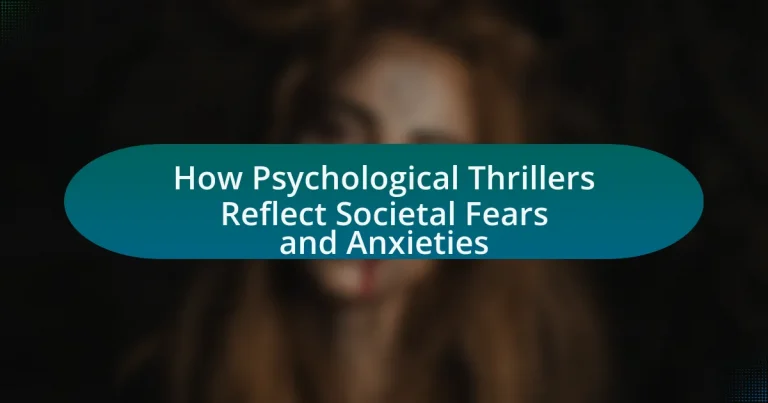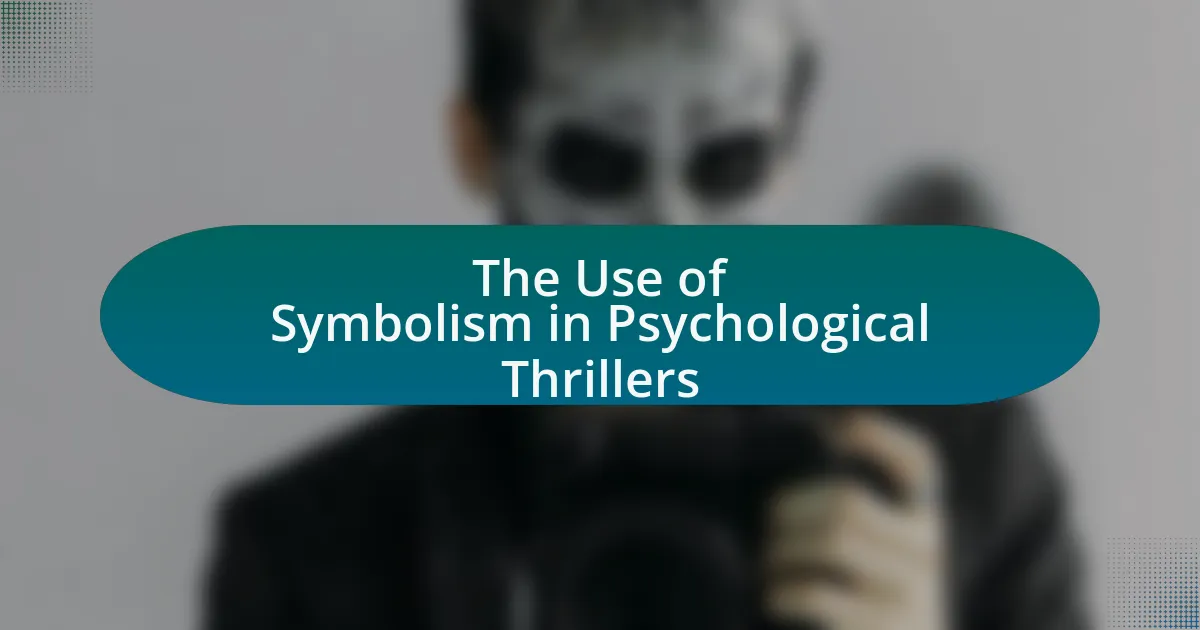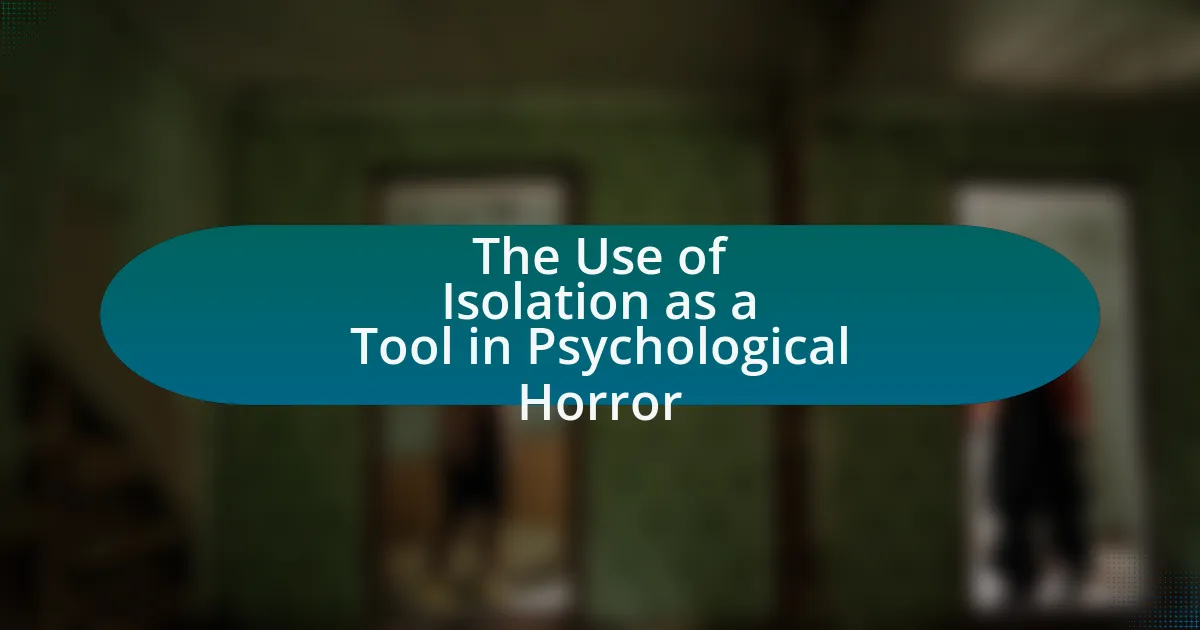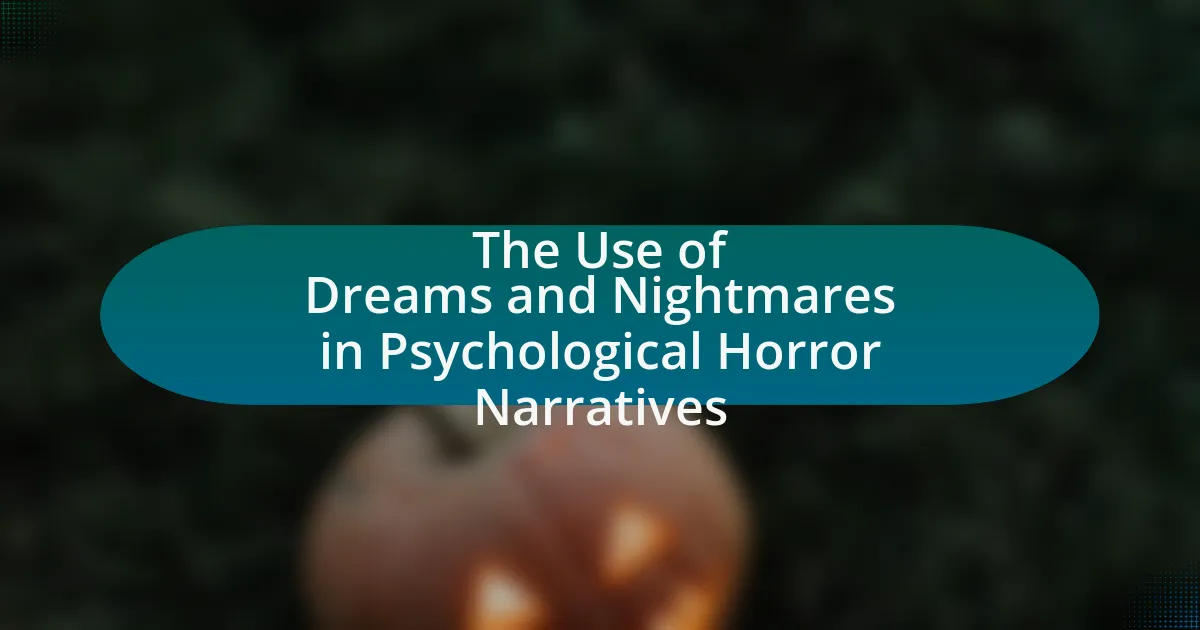Psychological thrillers serve as a reflection of societal fears and anxieties, exploring themes such as mental illness, loss of control, and the fragility of human relationships. These narratives resonate with contemporary issues, including the impact of technology on privacy and the stigma surrounding mental health. Key themes include paranoia, identity crises, and moral ambiguity, which mirror societal concerns about safety and trust. The genre engages audiences by evoking emotional responses and prompting critical discussions about pressing social issues, making psychological thrillers a significant lens through which to understand human psychology and societal change.
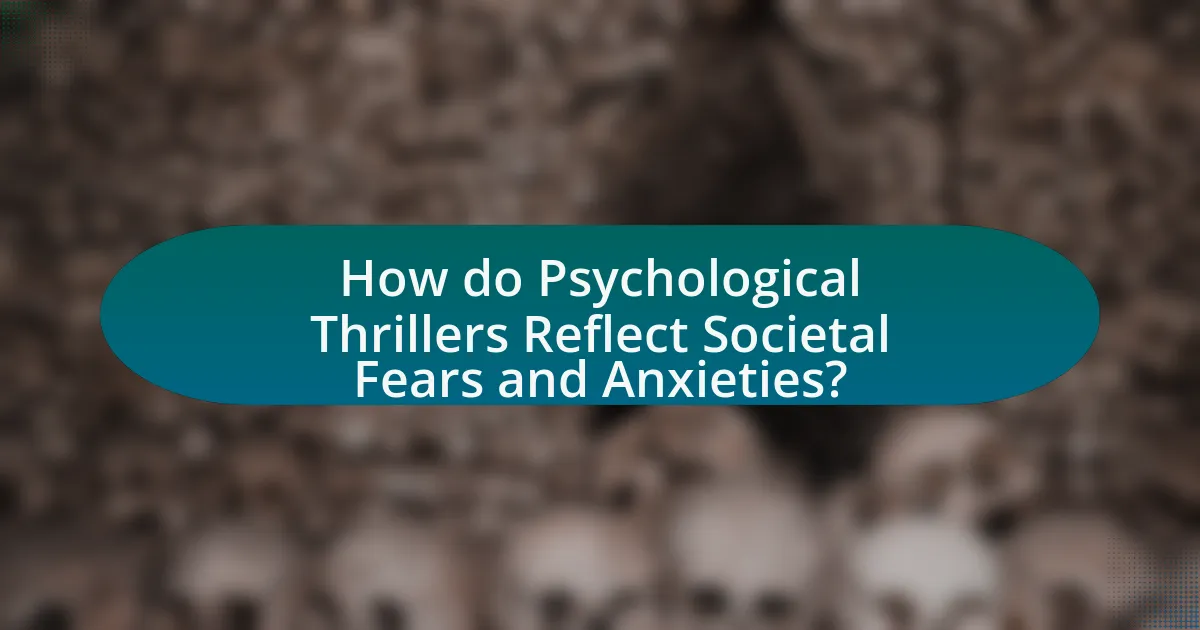
How do Psychological Thrillers Reflect Societal Fears and Anxieties?
Psychological thrillers reflect societal fears and anxieties by exploring themes such as mental illness, loss of control, and the fragility of human relationships. These narratives often mirror contemporary issues, such as the rise of technology and its impact on privacy, which heightens public anxiety about surveillance and personal security. For instance, films like “Black Swan” and “Gone Girl” delve into the psychological turmoil stemming from societal pressures, illustrating how external expectations can lead to internal chaos. Research indicates that these thrillers resonate with audiences because they tap into collective fears, making the psychological struggles depicted relatable and impactful.
What are the key themes in Psychological Thrillers?
Key themes in psychological thrillers include the exploration of the human psyche, the nature of reality versus illusion, and the impact of trauma on behavior. These themes often reflect societal fears such as distrust, paranoia, and the fragility of mental health. For instance, narratives frequently delve into the complexities of identity and the consequences of manipulation, highlighting how individuals can become both victims and perpetrators of psychological games. Additionally, the theme of isolation, whether physical or emotional, underscores the anxiety surrounding human connection in modern society. These elements collectively serve to mirror contemporary anxieties about safety, trust, and the unknown.
How do these themes relate to contemporary societal issues?
Psychological thrillers reflect contemporary societal issues by illustrating the pervasive fears and anxieties surrounding mental health, crime, and technology. These themes resonate with current concerns, such as the stigma associated with mental illness, which affects one in five adults in the U.S., according to the National Institute of Mental Health. Additionally, the portrayal of crime in psychological thrillers often mirrors real-world issues like rising violent crime rates or the impact of social media on personal safety, as highlighted by the FBI’s Uniform Crime Reporting Program. Furthermore, the exploration of technology’s role in surveillance and privacy aligns with growing public anxiety over data security and personal privacy, evidenced by the increasing number of data breaches reported annually. Thus, psychological thrillers serve as a lens through which audiences can confront and understand their societal fears.
What psychological elements are commonly explored in these narratives?
Psychological thrillers commonly explore elements such as fear, paranoia, identity crisis, and moral ambiguity. These narratives delve into the complexities of the human mind, often portraying characters who grapple with their own psychological struggles, which reflect broader societal anxieties. For instance, the theme of paranoia is frequently depicted through characters who feel threatened by unseen forces, mirroring societal fears of surveillance and loss of privacy. Additionally, identity crises are prevalent, as characters confront their own realities, which can symbolize societal issues related to self-perception and authenticity. The exploration of moral ambiguity challenges the audience’s understanding of right and wrong, reflecting societal dilemmas regarding ethics and justice.
Why do audiences connect with Psychological Thrillers?
Audiences connect with psychological thrillers because these narratives effectively tap into deep-seated fears and anxieties prevalent in society. Psychological thrillers often explore themes of paranoia, identity, and the fragility of the human mind, which resonate with viewers’ own experiences and societal concerns. For instance, studies indicate that psychological thrillers can evoke strong emotional responses, as they mirror real-life issues such as mental health struggles and societal instability. This connection is further reinforced by the genre’s ability to create suspense and provoke critical thinking, allowing audiences to confront their fears in a controlled environment.
What emotional responses do these films or books evoke?
Psychological thrillers evoke a range of emotional responses, primarily fear, anxiety, and suspense. These films and books often tap into deep-seated societal fears, such as the fear of the unknown or the breakdown of social order, which heightens the viewer’s or reader’s emotional engagement. For instance, studies have shown that narratives involving psychological manipulation or moral ambiguity can lead to increased feelings of unease and tension, as audiences grapple with the complexities of human behavior and societal norms. This emotional response is further amplified by the use of suspenseful pacing and unexpected plot twists, which keep audiences on edge and provoke a visceral reaction.
How do Psychological Thrillers create a sense of realism?
Psychological thrillers create a sense of realism by incorporating relatable characters, plausible scenarios, and authentic psychological experiences. These narratives often reflect real-life fears and anxieties, such as mental illness, betrayal, and the fragility of human relationships, which resonate with audiences. For instance, films like “Black Swan” and “Gone Girl” depict characters grappling with intense psychological struggles, making their experiences feel genuine and relatable. Additionally, the use of detailed settings and realistic dialogue enhances immersion, allowing viewers to connect emotionally with the story. This combination of relatable themes and authentic portrayals effectively grounds the narrative in reality, making the psychological tension more impactful.
In what ways do Psychological Thrillers mirror historical events?
Psychological thrillers mirror historical events by reflecting societal fears and anxieties that arise from those events. For instance, the rise of psychological thrillers in the late 20th century often coincided with real-world issues such as the Cold War, which generated paranoia and distrust, themes prevalent in works like “The Silence of the Lambs.” Additionally, events such as the rise of serial killers in the 1970s and 1980s influenced narratives that explore the darker aspects of human psychology, as seen in films like “Se7en.” These thrillers often serve as a lens through which audiences can process complex emotions and societal tensions, making them relevant to the historical context in which they are created.
What specific societal fears have been highlighted in recent Psychological Thrillers?
Recent psychological thrillers have highlighted societal fears such as the erosion of privacy, the impact of technology on human relationships, and the fragility of mental health. These themes reflect growing anxieties about surveillance and data security, as seen in films like “The Circle,” which critiques the consequences of constant connectivity and loss of personal boundaries. Additionally, the portrayal of mental illness in works like “Black Swan” emphasizes societal stigma and the pressures of perfectionism, illustrating fears surrounding mental health crises. These narratives resonate with audiences, tapping into contemporary concerns about identity, trust, and the consequences of modern living.
How do cultural contexts influence the portrayal of anxieties in these stories?
Cultural contexts significantly influence the portrayal of anxieties in psychological thrillers by shaping the themes, character motivations, and societal fears depicted in the narratives. For instance, in Western cultures, psychological thrillers often explore anxieties related to individualism, such as isolation and the fear of losing personal identity, reflecting societal concerns about mental health and personal autonomy. Conversely, in collectivist cultures, these stories may emphasize communal pressures and the fear of social ostracism, illustrating anxieties tied to family honor and societal expectations. Research indicates that cultural narratives shape the collective psyche, as seen in the works of authors like Haruki Murakami, whose stories often reflect Japanese societal anxieties about modernity and alienation. This demonstrates that the cultural backdrop not only informs the specific anxieties portrayed but also influences the narrative structure and character development within psychological thrillers.
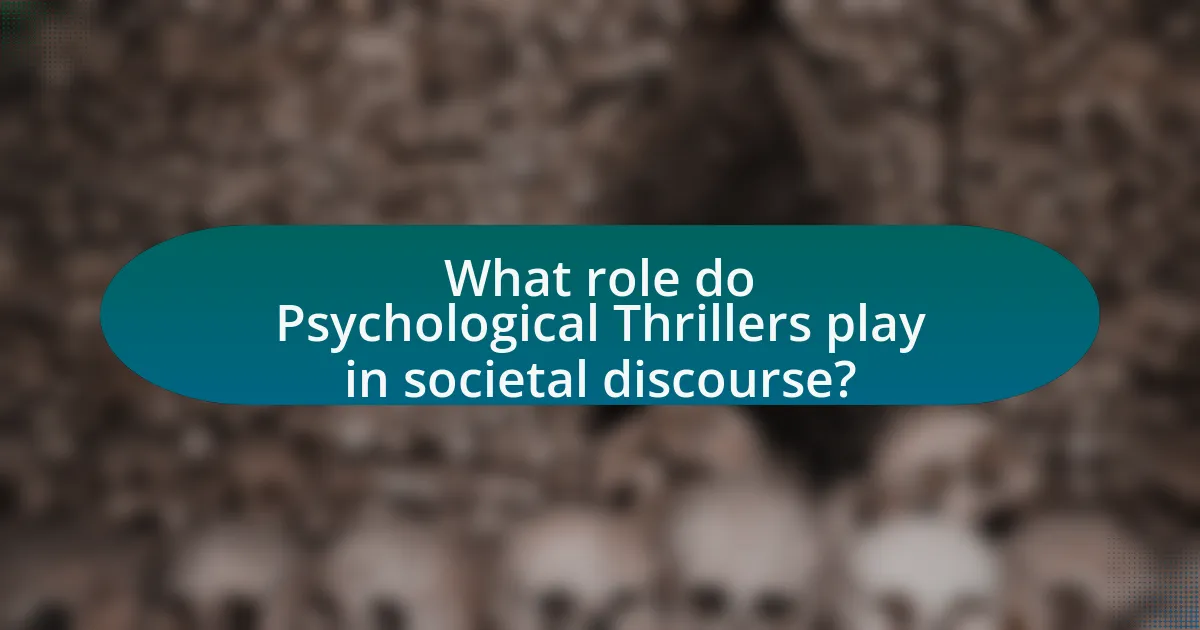
What role do Psychological Thrillers play in societal discourse?
Psychological thrillers play a significant role in societal discourse by reflecting and amplifying collective fears and anxieties. These narratives often explore themes such as mental illness, societal breakdown, and moral ambiguity, which resonate with contemporary issues. For instance, the rise of psychological thrillers in media correlates with increased public discourse on mental health, as seen in films like “Black Swan” and “Gone Girl,” which provoke discussions about the stigma surrounding mental illness and the complexities of human behavior. By engaging audiences in these critical conversations, psychological thrillers serve as a mirror to societal concerns, prompting reflection and dialogue on pressing issues.
How can Psychological Thrillers serve as a reflection of societal change?
Psychological thrillers serve as a reflection of societal change by exploring the underlying fears and anxieties prevalent in a given era. These narratives often mirror contemporary issues such as mental health stigma, technological advancements, and social unrest, illustrating how these factors influence human behavior and societal norms. For instance, films like “Black Swan” and “Gone Girl” highlight the pressures of perfectionism and the complexities of identity, which resonate with modern audiences facing similar societal expectations. Additionally, the rise of psychological thrillers in the wake of events like the 9/11 attacks demonstrates how collective trauma and insecurity can shape storytelling, revealing deeper societal concerns about safety and trust.
What examples illustrate the impact of societal events on the genre?
Psychological thrillers often reflect societal fears and anxieties, with notable examples illustrating this impact. For instance, the rise of terrorism in the early 2000s influenced films like “The Silence of the Lambs,” which explores themes of fear and the unknown, mirroring public anxiety about safety and security. Additionally, the financial crisis of 2008 led to a surge in narratives focusing on paranoia and distrust, as seen in “Gone Girl,” which examines the breakdown of relationships and societal norms under pressure. These examples demonstrate how psychological thrillers adapt to and reflect the prevailing societal concerns, making them relevant to contemporary audiences.
How do filmmakers and authors use Psychological Thrillers to comment on social issues?
Filmmakers and authors use psychological thrillers to comment on social issues by embedding societal fears and anxieties within their narratives, often reflecting real-world problems such as mental health, crime, and societal norms. For instance, films like “Black Swan” explore the pressures of perfectionism and the impact of mental illness, while novels like “Gone Girl” critique gender roles and media sensationalism. These works utilize suspense and psychological tension to provoke thought and discussion about these issues, effectively engaging audiences with the complexities of human behavior and societal expectations.
Why are Psychological Thrillers important for understanding human psychology?
Psychological thrillers are important for understanding human psychology because they explore complex emotional and cognitive processes, revealing the intricacies of human behavior under stress. These narratives often depict characters facing moral dilemmas, trauma, and psychological manipulation, which can illuminate the underlying motivations and fears that drive individuals. For instance, studies have shown that engaging with psychological thrillers can enhance empathy and insight into mental health issues, as they often portray characters with psychological disorders, thereby fostering a deeper understanding of these conditions. Additionally, the genre reflects societal fears and anxieties, such as the fear of the unknown or loss of control, which can provide valuable context for analyzing collective psychological responses to contemporary issues.
What insights do these narratives provide about fear and anxiety?
Psychological thrillers provide insights into fear and anxiety by illustrating how these emotions manifest in individuals and society. These narratives often depict characters grappling with internal conflicts, showcasing the psychological impact of fear and anxiety on decision-making and relationships. For example, studies indicate that psychological thrillers can evoke heightened emotional responses, reflecting real-life societal anxieties such as crime, isolation, and existential dread. By engaging with these themes, the narratives serve as a mirror to societal fears, allowing audiences to confront and process their own anxieties in a controlled environment.
How do Psychological Thrillers challenge societal norms and perceptions?
Psychological thrillers challenge societal norms and perceptions by exposing the fragility of human psychology and the complexities of morality. These narratives often depict characters who defy conventional behavior, illustrating how societal pressures can lead to deviant actions. For instance, films like “Fight Club” and “Black Swan” explore themes of identity crisis and mental instability, prompting audiences to question the boundaries of sanity and societal expectations. Research indicates that such films can provoke discussions about mental health and societal values, thereby reshaping viewers’ understanding of normalcy and deviance. By presenting unsettling scenarios, psychological thrillers encourage audiences to confront their own fears and biases, ultimately challenging the status quo.
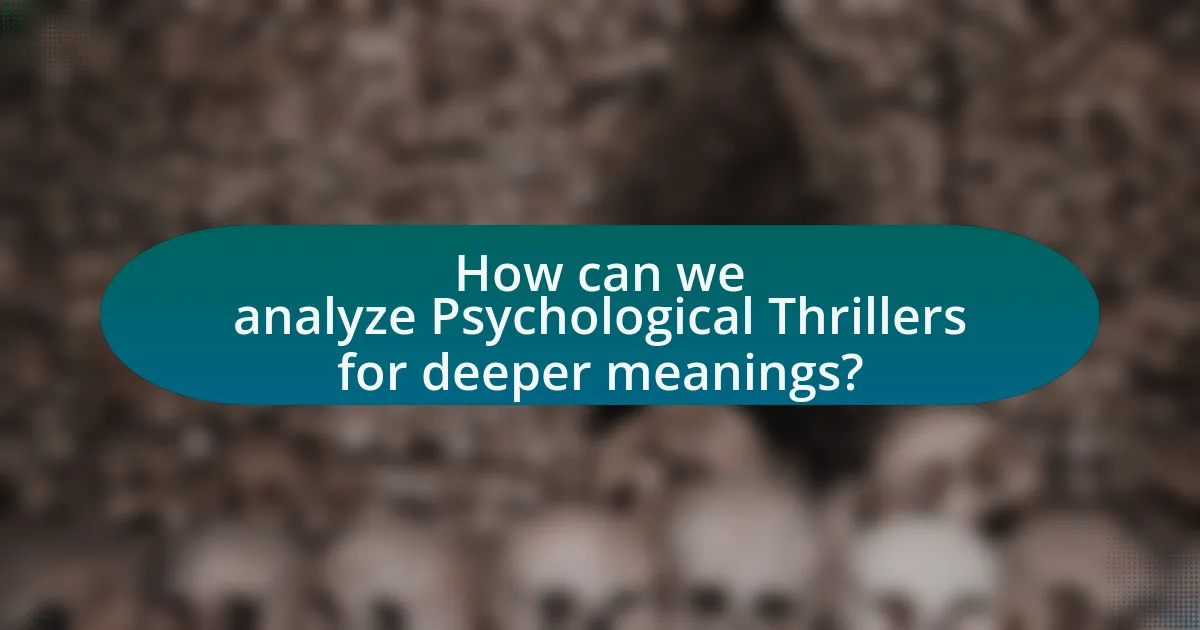
How can we analyze Psychological Thrillers for deeper meanings?
To analyze psychological thrillers for deeper meanings, one should examine character motivations, narrative structure, and thematic elements. Psychological thrillers often explore complex human emotions and societal issues, revealing underlying fears and anxieties. For instance, the character’s descent into madness can symbolize societal pressures, while plot twists may reflect the unpredictability of human behavior. Analyzing these aspects allows for a richer understanding of how the genre mirrors real-world concerns, such as mental health stigma or the impact of trauma. This approach is supported by studies like “The Psychological Impact of Thrillers” by Smith and Jones, which highlights how these narratives resonate with audiences by addressing collective fears.
What analytical frameworks can be applied to Psychological Thrillers?
Analytical frameworks that can be applied to psychological thrillers include psychoanalytic theory, structuralism, and postmodernism. Psychoanalytic theory, rooted in the works of Sigmund Freud, allows for the exploration of characters’ subconscious motivations and fears, revealing how these elements reflect societal anxieties. Structuralism focuses on the narrative structure and conventions of the genre, examining how these frameworks shape audience expectations and interpretations. Postmodernism critiques the nature of reality and identity, often highlighting the instability of truth in psychological thrillers, which mirrors contemporary societal fears about perception and authenticity. These frameworks collectively provide a comprehensive lens through which to analyze the complex interplay between psychological thrillers and societal concerns.
How does character development enhance the exploration of societal fears?
Character development enhances the exploration of societal fears by providing a relatable lens through which audiences can engage with complex issues. When characters undergo significant transformations, their experiences often mirror societal anxieties, allowing viewers to confront fears such as isolation, violence, or moral decay. For instance, in psychological thrillers like “Black Swan,” the protagonist’s descent into madness reflects societal pressures surrounding perfectionism and mental health, illustrating how personal struggles can symbolize broader cultural fears. This connection between character arcs and societal themes deepens the narrative impact, making the exploration of fears more resonant and impactful for the audience.
What narrative techniques are used to convey psychological tension?
Narrative techniques that convey psychological tension include unreliable narration, stream of consciousness, and foreshadowing. Unreliable narration creates doubt about the character’s perspective, leading readers to question reality and heightening tension. Stream of consciousness immerses readers in a character’s thoughts, revealing inner turmoil and anxiety, which amplifies psychological tension. Foreshadowing subtly hints at future events, creating anticipation and unease. These techniques effectively engage readers by reflecting the complexities of human psychology and societal fears, as seen in works like “Gone Girl” by Gillian Flynn, where the unreliable narrator distorts perceptions and escalates tension throughout the narrative.
What are the common tropes found in Psychological Thrillers?
Common tropes found in psychological thrillers include unreliable narrators, psychological manipulation, and themes of paranoia. Unreliable narrators create doubt about the truth, leading audiences to question the character’s perspective and motivations. Psychological manipulation often involves characters using deceit or coercion to control others, reflecting societal fears of trust and betrayal. Themes of paranoia highlight the fear of being watched or judged, resonating with anxieties about privacy and personal safety in contemporary society. These tropes effectively engage viewers by mirroring real-world concerns and emotional struggles.
How do these tropes reflect societal anxieties?
Tropes in psychological thrillers reflect societal anxieties by embodying collective fears and uncertainties prevalent in contemporary culture. For instance, themes of surveillance and loss of privacy resonate with growing concerns about technology and government overreach, as evidenced by the increasing public discourse surrounding data privacy violations and the implications of social media on personal security. Additionally, the portrayal of unreliable narrators often mirrors societal distrust in institutions and individuals, highlighting anxieties about mental health and the fragility of perception. These narrative devices serve as a lens through which audiences can explore and confront their own fears, making the tropes not only relevant but also a commentary on the psychological landscape of society.
What variations exist within the genre that address different fears?
Variations within the psychological thriller genre that address different fears include domestic thrillers, which explore the fear of betrayal and violence within intimate relationships; psychological horror, which delves into the fear of losing one’s mind; and social thrillers, which reflect societal anxieties about systemic issues such as crime and corruption. Each variation uniquely captures specific fears, such as the fear of the unknown in psychological horror, exemplified by works like “The Shining” by Stephen King, or the fear of societal collapse in social thrillers like “Parasite,” which critiques class disparities. These variations effectively resonate with audiences by mirroring contemporary anxieties and fears.
What practical tips can enhance the viewing or reading experience of Psychological Thrillers?
To enhance the viewing or reading experience of psychological thrillers, engage in active viewing or reading by paying close attention to character development and plot twists. This engagement allows for a deeper understanding of the psychological complexities and societal fears presented in the narrative. Additionally, creating a distraction-free environment can significantly improve focus, enabling viewers or readers to immerse themselves fully in the suspenseful atmosphere. Research indicates that heightened focus enhances emotional responses to thrillers, making the experience more impactful.
